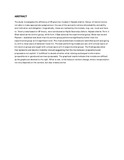| dc.description.abstract | The study investigates the efficiency of SF grammar modals in Kajiado district, Kenya. L2 learners were not able to make appropriate judgments on the use of the semantic notions of probability and ability and inclination and obligation. Linguistically, these are realized by the modals, may, can, must and have to. Twenty tests based on SF theory, were conducted at Najile Secondary School, Kajiado district. Form 3 West acted as the control group, while form 3 East acted as the experimental group. Mean scores and Pearson r statistical test show that the control group performed significantly better than the experimental group at 0.5 significant level. The most problematic modals are identified as will and going to, with a mean score of between 0 and 0.5.
The best performing modals are can, with a mean score of 6.0 (control group) and ought with a mean score of 3.5 (experimental group). The findings also show that epistemic and deontic modality interact suggesting that the line between propositions and proposals is not explicit. It is difficult to decide whether what is being exchanged is information (propositions) or goods and services (proposals). The graphical results indicate that modals are difficult as the graphs are skewed to the right. What is new, is the focus on context change, where interpretation not only depends on the context, but also creates context. | en_US |

